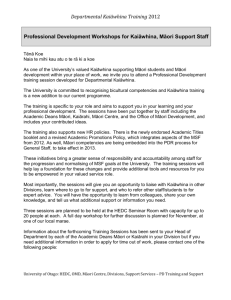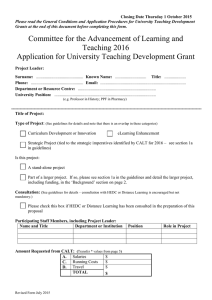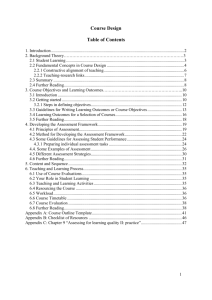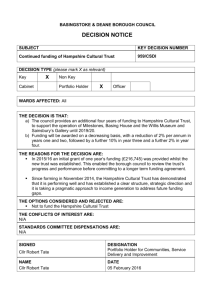CHAPTER Hedc 400 DEGREE-GRANTING ... PHYSICAL PRESENCE IN NEW HAMPSHIRE
advertisement
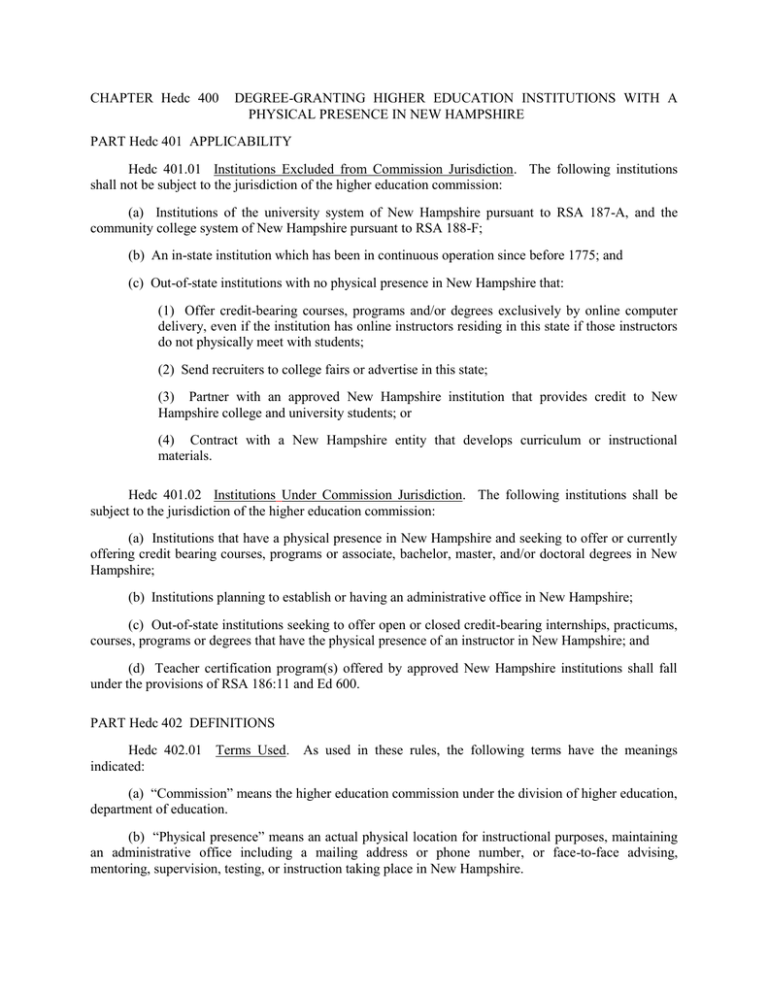
CHAPTER Hedc 400 DEGREE-GRANTING HIGHER EDUCATION INSTITUTIONS WITH A PHYSICAL PRESENCE IN NEW HAMPSHIRE PART Hedc 401 APPLICABILITY Hedc 401.01 Institutions Excluded from Commission Jurisdiction. The following institutions shall not be subject to the jurisdiction of the higher education commission: (a) Institutions of the university system of New Hampshire pursuant to RSA 187-A, and the community college system of New Hampshire pursuant to RSA 188-F; (b) An in-state institution which has been in continuous operation since before 1775; and (c) Out-of-state institutions with no physical presence in New Hampshire that: (1) Offer credit-bearing courses, programs and/or degrees exclusively by online computer delivery, even if the institution has online instructors residing in this state if those instructors do not physically meet with students; (2) Send recruiters to college fairs or advertise in this state; (3) Partner with an approved New Hampshire institution that provides credit to New Hampshire college and university students; or (4) Contract with a New Hampshire entity that develops curriculum or instructional materials. Hedc 401.02 Institutions Under Commission Jurisdiction. The following institutions shall be subject to the jurisdiction of the higher education commission: (a) Institutions that have a physical presence in New Hampshire and seeking to offer or currently offering credit bearing courses, programs or associate, bachelor, master, and/or doctoral degrees in New Hampshire; (b) Institutions planning to establish or having an administrative office in New Hampshire; (c) Out-of-state institutions seeking to offer open or closed credit-bearing internships, practicums, courses, programs or degrees that have the physical presence of an instructor in New Hampshire; and (d) Teacher certification program(s) offered by approved New Hampshire institutions shall fall under the provisions of RSA 186:11 and Ed 600. PART Hedc 402 DEFINITIONS Hedc 402.01 Terms Used. As used in these rules, the following terms have the meanings indicated: (a) “Commission” means the higher education commission under the division of higher education, department of education. (b) “Physical presence” means an actual physical location for instructional purposes, maintaining an administrative office including a mailing address or phone number, or face-to-face advising, mentoring, supervision, testing, or instruction taking place in New Hampshire. PART Hedc 403 INCORPORATION Hedc 403.01 Institutions Seeking Incorporation in New Hampshire. Pursuant to RSA 292:8-c through 8-h, the commission shall advise the legislature concerning the granting of degrees. Any institution that intends to seek incorporation as a degree-granting institution in New Hampshire shall secure approval from the commission prior to seeking authority from the legislature and shall submit articles of agreement as required by RSA 292:8-c and 8-d and shall be subject to the provisions of Hedc 405. Hedc 403.02 Institutions Seeking Incorporation in New Hampshire with a Main Campus Outside the United States. (a) Pursuant to RSA 292:8-c through 8-h, the commission shall advise the legislature concerning the granting of degrees. (b) Any institution that intends to seek incorporation as a degree-granting institution with a main campus outside the United States shall secure approval from the commission prior to seeking authority from the legislature and shall submit articles of agreement as required by RSA 292:8-c and 8-d and shall be subject to the provisions of Hedc 405. (c) In addition, it shall submit the following information: (1) Information regarding legal status of the institution in the country/countries in which it currently operates or intends to operate, and recognition by the country/countries in which it intends to operate by the ministry of education and accreditor(s) as applicable; (2) Evidence of a staffed administrative office in New Hampshire; (3) Evidence of representation by legal counsel who is a member of the Bar in New Hampshire or another state; (4) Annual financial audits by a certified public accountant in the U.S. or by a U.S. affiliate firm in the country or countries where the institution operates or plans to operate; (5) Accreditation status/intentions with a regional or national agency recognized by the U.S. department of education, the council for higher education accreditation, or both; (6) Evidence that the institution’s leadership has significant experience with American higher education; and (7) Evidence that the governing board includes members from the New Hampshire community. PART Hedc 404 EVALUATION PROCESS Hedc 404.01 Initiating the Evaluation Process. (a) Any institution seeking commission approval(s) shall discuss the proposed plan with the director or designated representative. (b) The institution shall identify the: (1) Name of the institution; (2) Approval(s) sought; (3) Reasons therefore; (4) Proposed timeline; and (5) Anticipated benefits to students and to New Hampshire. Hedc 404.02 Determination of Review Type. (a) The director shall determine the type of review required based upon the program request, incorporated status, accreditation status, institutional sustainability, and previous approvals granted to the institution. (b) Types of reviews shall be as follows: (1) A comprehensive review; (2) An expedited review; and (3) An administrative review. (c) A comprehensive review shall require the institution’s written plan to respond to each standard in Hedc 405 and the review shall be conducted by an evaluation team; (d) An expedited review requires the institution’s written plan to respond to each standard in Hedc 405 as appropriate: (1) The expedited review shall be conducted by the director or by an evaluation team; (2) The expedited review shall be used for the following: a. In-state institutions seeking degree-granting approval for a new degree or new degree level not covered by earlier approvals; and b. Out-of-state institutions seeking approval to offer open credit-bearing courses, programs/degrees or a branch campus. (e) An administrative review shall be conducted by the director and/or an evaluator for an institution that is accredited by a regional or national agency recognized by the U.S. department of education, the council for higher education accreditation, or both. (f) The administrative review shall be used for the following: (1) In-state institutions seeking approval for a new program within an existing approved degree or degree level, or a review of an already approved program; (2) Out-of-state institutions seeking approval to offer open internships or practicums that require a memorandum of understanding and/or have a physical presence of an instructor; and (3) Out-of-state institutions seeking approval to offer closed credit-bearing internships, practicums, courses or degrees for which the general public is not admitted and the institution does not publicly advertise. Hedc 404.03 Comprehensive Review. (a) An evaluation team shall conduct a comprehensive review that requires the institution’s written plan responding to each standard in Hedc 405. (b) The evaluation team shall link specialized licensing or professional accrediting agencies when such is pertinent to professional practice of development, or when licensure is required in New Hampshire for professional practice pursuant to RSA 292:8-e. (c) Upon completion of the evaluation, the evaluation team shall submit an evaluation report that: (1) Considers in detail, the institution’s compliance with Hedc 405; and (2) Makes a recommendation as to whether the commission should grant or continue approval. (d) The institution shall have an opportunity to respond to the evaluation report and to respond to any specific questions within 10 days. Hedc 404.04 Expedited or Administrative Review. (a) Any institution undergoing an expedited or administrative review shall submit a written plan addressing the points below and Hedc 405 as appropriate: (1) The name of the institution; (2) Approval being sought; (3) Previous degree-granting authority awarded by the legislature and approved by the commission; (4) Rationale for development of the proposed program within the stated institutional mission; (5) Program planning and development process utilized in developing the request; (6) Proposed course, program or degree offering, syllabi, relevant biographies and credentials of faculty expected to teach in the proposed program; (7) A demographic description of students to be served; (8) New resources that will be required to fully implement the curriculum; (9) Changes and shifts in organization and governance required to adjust to the proposed program; (10) The location to be used and the anticipated timeframe/duration of the offering(s); (11) Anticipated benefits to students, and New Hampshire; (12) Documentation that the institution is in good standing with a regional or national accrediting agency recognized by the U.S. department of education, the council for higher education accreditation, or both; (13) Copies of most recent accreditation report(s), including any progress on substantive recommendations and/or concerns found; (14) Certificate of registration filed with the New Hampshire secretary of state; and (15) Copies of a signed contract or memorandum of understanding with New Hampshire educational or business entity, if applicable. (b) Any institution undergoing an administrative review for an already approved program shall submit a written plan which: (1) Updates any information or changes for each of the standards in Hedc 405; and (2) Responds to the concerns, suggestions and recommendations in the commission’s most recent approval of the program(s). Hedc 404.05 Evaluation Materials. An institution shall submit 6 copies, plus an electronic version, of a written plan that addresses the standards in Hedc 405 at least 6 months in advance of the anticipated implementation date. Hedc 404.06 Notification. The director shall notify the chairpersons of both the House and Senate education committees so that each may appoint a member to participate on those evaluations conducted by an evaluation team. Hedc 404.07 Decision by the Commission. (a) Upon receipt of the evaluation report, the commission shall review the report and vote to accept, amend or reject the recommendations contained therein based upon its determination of compliance with Hedc 405. (b) The institution shall be invited to attend the meeting of the commission to answer any questions from the commission. (c) The director shall notify the institution of the commission’s decision in writing within 10 days of the commission vote. (d) Unless otherwise authorized, the institution shall not advertise or commence instruction until commission approval is granted. (e) If the decision of the commission is to reject an institution’s application for degree-granting authority, based on non-compliance with Hedc 405, the details of that decision shall be included in the letter of notification. (f) The institution may appeal the commission’s decision. PART Hedc 405 STANDARDS FOR AN EVALUATION Hedc 405.01 Institutional Purpose and Mission. (a) In its written plan, the applicant shall set forth: (1) A well-defined statement of the institution’s purpose and mission; (2) Specific learning objectives for its students both generally and in each program of study; and (3) A narrative statement describing how the institution achieves or will achieve the purpose and mission set forth in the statement of purpose. (b) The applicant shall submit the following documents: (1) A copy of the vote of the board of the institution’s resolution adopting the statement of purpose as submitted; (2) A certified copy of the bylaws or other governing instrument specifying the procedures for amendment of the statement of purpose; and (3) A certificate of registration filed with the New Hampshire secretary of state. Hedc 405.02 Organization and Governance. (a) The applicant shall describe its organization and governance structures in its written plan, including: (1) Organizational charts, administrative responsibilities showing the lines of authority and the relationships among component units and personnel; and (2) Evidence of a governing board of 7 or more people of which fewer than one-half have any financial interest in the institution as an employee, stock-holder or corporate director. (b) The governing board who will be responsible for the general policies and control of the institution and which shall: (1) Meet at least twice in each fiscal year; and (2) Keep written minutes of the actions taken at these formal meetings or otherwise maintain a record of proceedings. (c) The role of trustees, administrators, faculty, and students and the nature and extent of the involvement of each in the determination of policies and the resolution of issues, including academic program and curriculum development. Hedc 405.03 Educational Program. The applicant shall describe its educational program in its written plan, including: (a) How the educational program reflects the purpose and mission of the institution through curricula; (b) Clearly and accurately describing curricula in all published materials; (c) Clearly stating the level of instruction and reflecting the resources of the institution, including but not limited to program support in the following areas: (1). Financial resources; (2) Personnel; (3) Facilities; and (4) The level of academic preparation of the students; (d) The applicant shall provide evidence that it provides students with course syllabi that includes: (1) Course objectives; (2) Course outcomes; (3) Requirements; and (4) Standards of achievement; (e) The applicant shall provide evidence that the internal structure of course(s) rests within the purview of the appropriate faculty and academic leadership; (f) The applicant shall clearly describe the process for development, review and approval of educational policy; (g) The applicant shall document provisions for a systematic and broad-based assessment of student learning, assessment of educational program(s), and the evaluation and improvement of instruction; (h) The applicant shall articulate a sequence of courses leading to the attaining of a degree in the respective area or field of study; (i) The applicant shall link program goals with achievement of student outcomes; (j) At the associate degree level, the applicant shall have requirements for graduation that are based upon successful completion of a minimum of 60 semester hours of study; (k) At the baccalaureate degree level, the applicant shall provide evidence that the program: (1) Is planned to reflect a commitment to a particular area of inquiry; (2) Affords competence in the subject significantly beyond the introductory level; and (3) Is based upon successful completion of a minimum of 120 semester hours of study; (l) If organized on other than the usual semester basis, the applicant shall ensure that the educational program provided contains at least as many hours as an institution organized on the usual semester basis; (m) The applicant shall provide evidence that all courses offered by correspondence, distancelearning or away from the institution’s primary campus are consistent with, and comparable to, courses offered to resident students enrolled at the institution’s primary campus; and (n) The applicant shall clearly state student expectations for attaining degree requirements. Hedc 405.04 Graduation Requirements. The applicant shall define graduation requirements in its written plan and no more than 50% of the credits required for a degree or other credential shall be awarded for prior experiential learning and/or credits by examination. Hedc 405.05 Faculty. The applicant shall describe the faculty in its written plan and demonstrate that faculty: (a) Are competent as evidenced by: (1) Academic degrees from appropriately accredited institutions; (2) Academic knowledge in the discipline in which they teach; (3) Previous teaching experience which ensures that students will receive education consistent with the objectives of the program of study and the curricular requirements as stated in the institution’s published catalogue and web site or electronic media; and (4) Capacity to teach education programs per Hedc 405.03; (b) Meet or exceed the following standards in a 2-year associate program: (1) Faculty shall hold at least a master’s degree or its equivalency as determined under Hedc 405.05(a); and (2) The entire faculty shall have education or equivalent experience in the field of specialization in which they are teaching; (c) Meet or exceed the following standards in a 4-year baccalaureate degree program: (1) Faculty shall hold at least a master’s degree or its equivalency as determined under Hedc 405.05(a), in the field of specialization in which they are teaching; (2) At least 25% of the full-time faculty shall hold a doctoral degree or the appropriate terminal degree; and (3) The entire faculty shall have education or equivalent experience in the field of specialization in which they are teaching; (d) Meet or exceed the following standards in a master’s degree program: (1) Faculty shall hold at least a master’s degree or its equivalency as determined under (g) in the field of specialization in which they are teaching; (2) A majority of the faculty shall have satisfactorily completed work beyond the master’s degree; and (3) At least 40% of the full-time faculty shall hold a doctoral degree or an appropriate terminal degree; (e) If teaching in a doctoral program, hold a doctoral degree; (f) If teaching in a professional degree program, hold a doctoral or professional degree; (g) If granted approval to teach by the institution, an equivalency for any of the positions listed in (b) and (c), or meets the following requirements: (1) The institution shall state the reason for its equivalency in a narrative statement; (2) All equivalencies shall meet or exceed the requirements of the published course syllabus; and (3) The written job description for the position shall state what preparation is necessary to be considered equivalent to a candidate who has a degree in the field; (h) Are sufficient in number to ensure student faculty ratios consistent with the mission of the institution, and meet the following numerical standards: (1) The proportion of part-time faculty members and the student-teacher ratio shall be consistent with the institution’s purpose to provide effective instruction and guidance in each course consistent with the institution’s purpose; (2) In no instance shall the faculty number fewer than 4 full-time members; and (3) The faculty shall consist of full-time appointments sufficient in number and length of service to ensure continuity and stability of the educational programs; (i) Have a teaching load consistent with the time essential for preparation for each class, other assigned academic or administrative responsibility, and professional growth including, but not limited to, the pursuit of terminal degrees in the field, the attendance at professional meetings, research and publications; (j) Have professional and institutional responsibilities specifically defined in writing; (k) Have expectations for continuing professional study and/or scholarly activity, and are encouraged to participate in professional meetings and other scholarly activity related to faculty disciplines; (l) Have specified personnel policies concerning matters including, but not limited to, academic freedom, salaries and benefits, and incentive for professional growth. The institution shall adopt, maintain and follow policies governing initial appointments, reappointments and the dismissal of faculty, including adjunct faculty, and shall maintain records that evidence such policies are, in fact, followed; (m) Are appointed pursuant to the established procedures of the institution, and such appointments shall be promptly reported, in writing, to the governing board of the institution; (n) Are provided a written notice of appointment in which contains, or incorporates by specific reference, the conditions of employment and personnel policies with regard to academic freedom and economic security; (o) Are sufficient in number, with a full-time commitment to the institution, and length of service to ensure continuity of the educational program; and (p) Are provided a written contract for employment that includes information on salaries, fringe benefits, and provisions for academic freedom. Hedc 405.06 Student Body. The applicant shall describe the student body in its written plan and ensure that the student body: (a) If admitted to an associate or baccalaureate degree program, shall be required to have a high school diploma or the equivalent; (b) If admitted to a master’s or doctoral degree program, shall be required to complete at least a baccalaureate degree or the equivalent; (c) Has access to standards for continued enrollment in the institution’s catalogue or handbook; (d) Has access to policies which shall include, but not be limited to, appropriate counseling in program planning, course selection, registration procedures, deadlines for course additions or withdrawals, basic course requirements, satisfactory progress requirements; and (e) Has health services available, if attending an institution with residential facilities. Hedc 405.07 Student Records. The applicant shall describe its student records in its written plan and ensure that its student records: (a) Include, but are not limited to health, counseling, financial aid and academic transcripts; (b) Collect and maintain, insofar as is feasible, information concerning a graduate’s activities including: (1) Rate and field of employment; (2) Continued education; and (3) Performance on licensing examinations as appropriate; and (c) Have security and maintenance ensured by the institution as follows: (1) Physical records shall be stored in fire-resistant cabinets; (2) Records maintained in electronic systems shall be secured to prevent loss; and (3) Duplicates of written and electronic records shall be periodically made and separately stored to assure security of records. Hedc 405.08 Library and Information Resources. (a) The applicant shall provide for library and information resources in its written plan. (b) The library shall: (1) Have a written plan in accordance with the institution’s purpose, the nature of the education program, and the enrollment; (2) Have access provided to its basic physical and virtual collections. If other libraries or collections are to provide a major part of the library resources for the educational program, the extent of dependence shall be clearly stated and the nature and details of agreements shall be described; (3) If engaged in an agreement with other libraries and entities providing access to resources, specify the following: a. The degree to which the holdings of the other libraries or resources support the institution’s educational program and enrollment; and b. The degree to which students of the institution can use these libraries or resources; (4) Provide services including, but not limited to: a. Availability for student use at regularly posted times; b. Availability of resource and supervisory personnel and standard library services including, but not limited to, circulation, reference services, instruction and interlibrary loans; and c. Provisions for an atmosphere conducive to learning; (5) Keep up-to-date records of circulation, holdings, inventory data, materials on order, current periodicals received, subscription data base usage, expenditures and budgets; (6) Have sufficient holdings consistent with the purpose, the course offerings and enrollment of the institution; (7) Periodically review its holdings to assure that the holdings remain consistent with the course offerings; and (8) Have a budget adequate to maintain the above standards. Hedc 405.09 Facilities and Technologies. technologies in its written plan that shall: The applicant shall describe its facilities and (a) Be sufficient to meet the institution’s programs and objectives; (b) Comply with all applicable health and safety standards, codes, ordinances, and laws; and (c) If not owned by the institution, be evidenced through a lease or other arrangements to ensure that facilities and technologies are available to meet the institution’s stated objectives. Hedc 405.10 Financial Resources. The applicant shall describe its financial resources in its written plan and its financial resources shall: (a) Be adequate for the institution to: (1) Support and sustain its purpose; (2) Implement its program; and (3) Graduate its entering class as follows: a. For institutions seeking associate degree-granting authority, this shall mean a minimum period of 4 years; and b. For institutions seeking baccalaureate, masters, and doctoral degree-granting authority, this shall mean a minimum period of 6 years; (b) Be sufficient to allow the institution to adequately and effectively implement, achieve, and enhance its purposes and objectives as evidenced by the following: (1) Financial policies, procedures, and practices that ensure academic quality; and (2) A business plan for the time period described in (a)(3)a. and b., which includes: a. An enrollment plan which includes anticipated applications, deposits, yield and retention rates; b. Tuition and other sources of support; and c. Anticipated expenses; (c) Include a budget preparation process that is inclusive, and reviewed and approved by administrators and the institution’s governing board; (d) Have a budget, sufficient in detail to identify operating expenses including categories for: (1) Instruction; (2) Library; (3) Information resources and technology; (4) Student services; (5) Financial aid, including a calculation of the tuition discounting rate; and (6) Operation and maintenance of the physical plant; (e) Be administered by a chief financial officer who shall have: (1) Expertise, education, academic degrees and an understanding of higher education finances; (2) Responsibility for the financial and business operations of the institution; and (3) Responsibility for its institutional budget, overseeing its formulation, revision and implementation; (f) Provide evidence to demonstrate fiscal soundness including, but not limited to resources and a resource plan which will ensure operations through the time period described in (a)(3)a. and b., including: (1) Unrestricted net operating income demonstrating the institution’s ability to live within its resources; (2) Resources necessary to meet covenants in any debt or other similar obligations of the institution; (3) Expendable reserves to sustain academic quality should resources in (e)(2) not meet expenditure needs in any given year; and (4) An existing realistic plan addressing issues raised by existing operational deficits, or in the event of a significant financial challenge or actual financial crisis to the institution or program, and reflecting significant assets to guarantee student protection; (g) Be monitored through financial records which: (1) Are open for inspection and audit by the commission or its agents upon demand during normal working hours; (2) Are maintained in conformity with generally accepted accounting principles; (3) Include audited financial statements with an unqualified opinion for at least 2 consecutive years. Audited financial statements mean independently audited and certified annual financial statements which are completed within 6 months after the end of each fiscal year; and (4) Are kept in accordance with procedures that are sufficient to maintain financial integrity that gifts or grants given to the institution will be utilized according to the donor’s or grantor’s intent; (h) Establish that insurance is carried to protect the school’s financial interest sufficient to maintain the solvency of the school in case of loss by fire or other causes, and to protect it from instances of personal and public liability; and (i) If the institution has or plans to incur debt, maintain and update, as needed, a plan covering the period such debt will be outstanding and showing: (1) The anticipated interest and principal payments throughout the life of the debt; and (2) The provision for payment of such interest and principal as it becomes due and payable. Hedc 405.11 Public Disclosure. The applicant shall, in the public disclosure section of its evaluation plan, include a catalog and supporting materials that are accessible electronically and that include the following: (a) Explicitly worded statements about its current status with the commission, approvals from required licensing agencies, regional, national, and specialized accrediting agencies; (b) Identification of mission, ownership and control of the institution; (c) Information about the governing board, staff and faculty; (d) Admission requirements; (e) Courses, programs, degrees offered; (f) Program objectives, length of program, curriculum offerings, and degree requirements; (g) Rates of student success, including rates of retention, graduation and other measures of success appropriate to its institutional mission; (h) Schedule of tuition, fees, availability of financial aid, expected amount of student debt upon graduation, and all other charges and expenses necessary for completion of the course of study; (i) Procedures and policies related to transfer of credit, attending and withdrawing and a list of institutions with which it has an articulation agreement(s); (j) List of current faculty, indicating program affiliation, distinguishing between full and part-time status and showing degrees held/institution(s) attended; (k) Cancellation and refund policies; (l) Where to file student complaints and where to seek redress; (m) Locations and programs available at branch campuses, other instructional locations, including those overseas, along with a description of programs and services available at each location; and (n) Such other material facts concerning the institution as are reasonably likely to affect the decision of the student to enroll therein. PART Hedc 406 CONTINUING REVIEW Hedc 406.01 Annual Reports. In-state institutions under the jurisdiction of the commission shall file copies of annual or other reports as required by its recognized regional accrediting association(s). Hedc 406.02 Additional Reports. (a) Out-of-state institutions having commission approvals as described under Hedc 404.02(b)(2), (c)(2) and (3) shall file annual and/or other reports as specified in its commission approval(s). The director shall review and report compliance to the commission. (b) In-state institutions under the jurisdiction of the commission shall be required to file annual and/or other reports as specified in its commission approval(s). The director shall review and report compliance to the commission. (c) Additional report(s) shall be required at the discretion of the commission as necessary to provide additional information on the status of program approval. Hedc 406.03 Accreditation. (a) In lieu of conducting its own independent program or institutional evaluation, the commission shall accept accreditation by a regional or national agency recognized by the U.S. Department of Education, the Council for Higher Education, or both, when the program or institution is in good standing with no special requirements. (b) Any institution seeking initial degree-granting authority shall be in good standing with a regional or national accrediting agency recognized by the U.S. department of education, the council for higher education accreditation, or both, within 8 years of receiving initial commission approval. (c) Any change in status with accreditor(s), including probation notification, shall be provided to the commission to determine compliance with Hedc 405. Hedc 406.04 Institutions Undergoing a Substantive Change in Governance. Any institution with a substantial change in governance, including a 50% or greater change in the composition of the governing board within a one-year period or decisions by the board which would affect the mission, character, and quality of the institution shall inform the commission by submitting the following: (a) A letter and any documents explaining the reason for the changes, and how these changes will impact the mission, current operations, and students; (b) Public disclosure, including a timeline and student and donor notification; (c) Any other substantive changes altering the current activity in Hedc 405; (d) Any correspondence to and from institutional accrediting agencies; (e) Documentation of change in incorporated status, such as creation of a sole membership; and (f) Any contracts detailing arrangements regarding development of courses, programs or degrees by a non-title IV eligible entity. Hedc 406.05 Institutions Undergoing an Acquisition, Merger, Transfer, Sale of Assets. Any institution undergoing an acquisition, transfer, sale of assets if more than 25%, or merger, shall inform the commission by submitting the following: (a) A letter explaining the reason for the change; and (b) A transition plan and timetable that includes, but is not limited to: (1) Public disclosure and student and donor notification; (2) Evidence of sufficient fiscal resources to support the transition; (3) Acccreditor(s) expectations; (4) Any correspondence to and from institutional accrediting agencies; (5) Legal documents related to the transition; (6) Most recent audited financial statement; (7) Any changes in: a. Mission; b. Board appointments; c. Internal governance and leadership structure; d. Institutional leadership appointments; e. Faculty and staff appointments, along with terms of employment, including, but not limited to, working conditions and benefits; f. Enrollment; g. Program offerings; and h. Facilities; and (8) Any other substantive changes altering the current activity in Hedc 405. Hedc 406.06 Institutions Undergoing Closure. (a) Any institution that plans to close shall inform the commission by forwarding the following: (1) A transition plan and timetable that addresses and includes, but is not limited to: a. Public disclosure and student and donor notification; b. Changes in internal governance and leadership structure; and c. Changes in faculty and staff appointments; (2) A plan for discontinuation of programs that includes: a. Number of students impacted; b. Teach-out schedule detailing program completion at current institution; and c. Evidence of arrangement with another accredited institution for student transfer; (3) Evidence of fiscal resources necessary to support the transition; (4) Accreditor(s) expectations; and (5) Any correspondence to and from accrediting agencies. (b) Pursuant to RSA 292:8-kk, any institution that closes shall also submit the following: (1) Two original transcripts and an electronic transcript for each student who was enrolled for instruction at the institution; (2) One original copy of catalogs for each year in existence; (3) An explanation of the institution’s credit and grading system; and (4) A typed list of students. PART Hedc 407 DISCIPLINARY ACTION Hedc 407.01 Violations. (a) Alleged violations of RSA 292:8-g and RSA 292:8-h shall be reported by the commission to the department of justice for enforcement. (b) Written notification of alleged violations shall be given to the institution by the director. (c) Institutions shall provide a written response to the commission within 30 calendar days. (d) The commission shall consider the institution’s response and provide the opportunity for the institution to make an oral presentation. (e) Any institution dissatisfied with the commission’s decision may request a hearing within 60 days of the commission’s decision. Hedc 407.02 Suspension or Revocation of Authority. (a) Degree-granting authority of any institution which no longer meets the standards established by rules shall be suspended or revoked, pursuant to RSA 21-N:8-a,II(e). (b) Any institution which has not conducted regular instruction for 3 consecutive years and whose charter has not been repealed pursuant to RSA 292:8-ff IV, shall be evaluated before resumption of instruction. (c) Degrees which an institution has not awarded for 4 years shall be evaluated pursuant to Hedc 405 prior to the re-awarding of any such degree. Hedc 407.03 Hearing. Any institution dissatisfied with the commission’s decision may request a hearing within 60 days of the date of the commission’s decision. PART Hedc 408 FEES Hedc 408.01 Fees. (a) Fees for commission reviews and actions, and professional stipends, shall be as specified in Table Hedc 400-1 below. Table Hedc 400-1 SCHEDULE OF REQUIRED INSTITUTIONAL FEES Action INCORPORATION New institution – main campus in New Hampshire New institution – main campus outside the U.S. Out-of-state incorporated/branch campus in New Hampshire $10,000 $20,000 $10,000 COMMISSION REVIEWS Comprehensive Review (per program) Expedited Review (per program) Administrative Review (per program) Accreditation Observation by Director Annual Report from Out-of-State Institution (Hedc 406.02 (a)) $ 1,500 $ 1,000 $ 500 $ 500 $ 500 SUBSTANTIVE CHANGE IN GOVERNANCE $ 750 ACQUISITION, MERGER, TRANSFER, OR SALE OF ASSETS $ 1,000 INSTITUTIONAL CLOSURE $ 3,000 DISCIPLINARY ACTION $ 3,000 STIPENDS Chair – in-state site visit Chair – international site visit Team Member – in-state site visit Team Member – international site visit Accreditation Observer – in-state site visit Accreditation Observer – international site visit CLOSED SCHOOL TRANSCRIPTS Transcript Request Fee per transcript Fee $ 2,000 $ 3,000 $ 1,000 $ 1,500 $ 1,000 $ 1,500 $ 20 (b) All direct costs for institutional and/or program evaluations shall be the responsibility of the requesting institution. (c) Evaluators/observers shall be reimbursed for all expenses related to the evaluation, such as travel, lodging, and meals. Payment shall be made to the individual, but forwarded to the commission for recording 10 days following the site visit. (d) Checks for required fees shall be made payable to: Treasurer, State of New Hampshire and forwarded to the commission prior to on-site visits.

